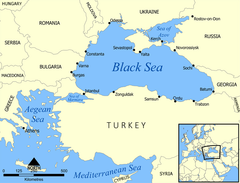Sea of Azoff
| Sea of Azov | |
|---|---|

Sea of Azov shoreline at Novaya Yalta, Donetsk Oblast
|
|
 |
|
| Coordinates | 46°N 37°E / 46°N 37°ECoordinates: 46°N 37°E / 46°N 37°E |
| Type | Sea |
| Primary inflows | Don and Kuban |
| Max. length | 360 km (220 mi) |
| Max. width | 180 km (110 mi) |
| Surface area | 39,000 km2 (15,000 sq mi) |
| Average depth | 7 metres (23 ft) |
| Max. depth | 14 m (46 ft) |
| Water volume | 290 km3 (240×106 acre·ft) |
The Sea of Azov (Russian: Азо́вское мо́ре, Azovskoye more; Ukrainian: Азо́вське мо́ре, Azovs'ke more/Azovśke more; Crimean Tatar: Azaq deñizi, Азакъ денъизи, ازاق دﻩﯕىزى) is a sea in Eastern Europe. To the south it is linked by the narrow (about 4 km or 2.5 mi) Strait of Kerch to the Black Sea, and it is sometimes regarded as a northern extension of the Black Sea. The sea is bounded in the north by mainland Ukraine, in the east by Russia, and in the west by the Crimean Peninsula. The Don and Kuban are the major rivers that flow into it. The Sea of Azov is the shallowest sea in the world, with the depth varying between 0.9 and 14 metres (2 ft 11 in and 45 ft 11 in). There is a constant outflow of water from the Sea of Azov to the Black Sea.
The sea is largely affected by the inflow of numerous rivers, which bring sand, silt, and shells, which in turn form numerous bays, limans, and narrow spits. Because of these deposits, the sea bottom is relatively smooth and flat with the depth gradually increasing toward the middle. Also, due to the river inflow, water in the sea has low salinity and a high amount of biomass (such as green algae) that affects the water colour. Abundant plankton results in unusually high fish productivity. The sea shores and spits are low; they are rich in vegetation and bird colonies.
The name likely derives from the settlement of an area around Azov, whose name comes from the Kipchak Turkish asak or azaq ("lowlands"). A Russian folk etymology, however, instead derives it from an eponymous Cuman prince named "Azum" or "Asuf", said to have been killed defending his town in 1067. A formerly common spelling of the name in English was the Sea of Azoff, which is closer to the Russian pronunciation.
...
Wikipedia
